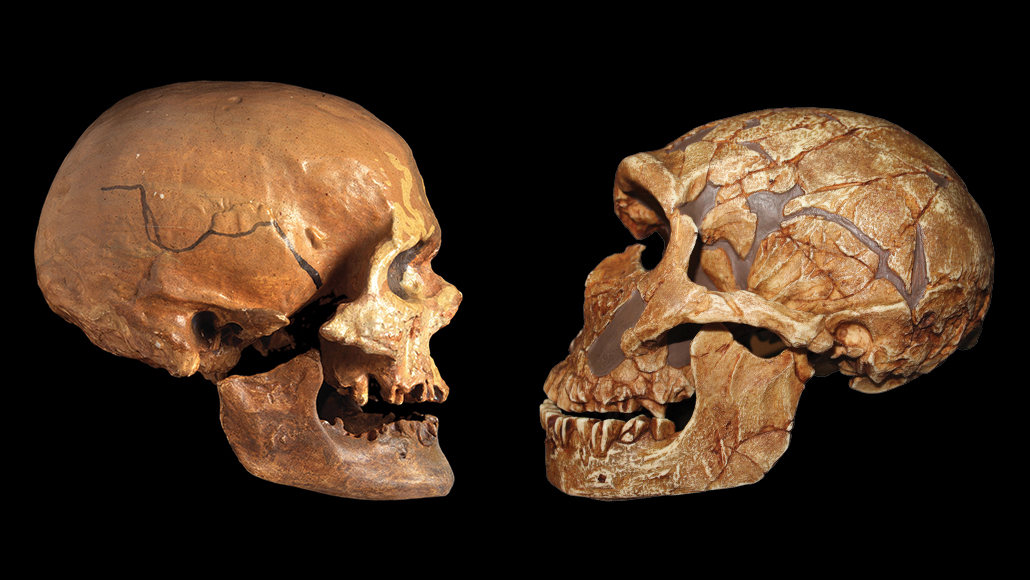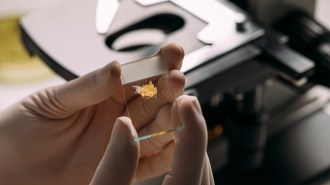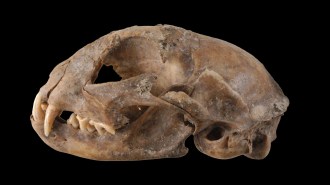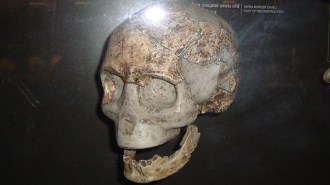
Ancient Europeans, represented by a roughly 30,000-year-old French Homo sapiens skull shown at left, interbred with Neandertals, represented by a 70,000- to 50,000-year-old French skull on the right, before spreading Neandertal genes into Africa, a new study finds.
From left: The Natural History Museum/Alamy Stock Photo; Sabena Jane Blackbird/Alamy Stock Photo
Africans today possess more Neandertal ancestry than previously thought, a new analysis shows, though still not as much as most people outside of Africa.
People who migrated out of Africa around 60,000 to 80,000 years ago interbred with Neandertals. That set the stage for some human groups to return to Africa carrying Neandertal genes that spread throughout the continent, apparently because those genes proved beneficial to ancient Africans, researchers report January 30 in Cell.
Sets of Neandertal gene variants inherited by modern Africans include genes involved in bolstering the immune system and modifying sensitivity to ultraviolet radiation, geneticist Joshua Akey of Princeton University and his colleagues found. Those genes presumably spread quickly once introduced to African humans. A new statistical approach for detecting ancient genetic material that’s still present in modern DNA, developed by Akey’s team, enabled this discovery of genetic inheritance that has gone unnoticed until now.
The researchers’ new technique also detected a human journey out of Africa roughly 100,000 to 150,000 years ago that led to the introduction of human genes into Neandertals via interbreeding. Some African DNA that appeared at first to have been inherited from Neandertals actually came from those ancient humans when scrutinized more closely, the investigators say.
“Our work highlights how humans and Neandertals interacted for hundreds of thousands of years, with populations dispersing out of and back into Africa,” Akey says. “Remnants of Neandertal DNA survive in every modern human population studied to date.”
Akey’s team analyzed DNA from 2,504 present-day Africans, Europeans and East Asians. Each person’s DNA was compared with DNA extracted by other researchers from Neandertal fossils found in Siberia and in southeastern Europe.
The new statistical program calculates the probability that specific segments of a person’s DNA represent an inheritance of Neandertal DNA segments. In contrast, previous approaches compared living people’s DNA to that of Neandertals as well as to a modern African group assumed to lack Neandertal ancestry, often Nigeria’s Yoruba people. But if those reference groups actually possess Neandertal DNA, as indicated by the new report, then earlier studies underestimated Neandertals’ genetic legacy.
Neandertals were humans’ closest evolutionary relatives, inhabiting parts of Europe and Asia from possibly more than 800,000 years ago until around 40,000 years ago (SN: 5/15/19). Neandertal DNA accounts for, on average, about 0.5 percent of individual Africans’ genetic inheritance, or genome, far more than reported in earlier studies, Akey’s team concludes. Most present-day people outside Africa carry about three times as much Neandertal DNA as Africans do, the researchers say. More than 94 percent of Neandertal DNA sequences detected in today’s Africans have also been observed in non-Africans, they say.
Surprisingly, the new study also identifies comparable proportions of Neandertal DNA in the genomes of modern Europeans and East Asians, about 1.7 percent and 1.8 percent, respectively. Earlier studies had estimated that East Asians possessed about 20 percent more Neandertal ancestry than Europeans.
Although the efficacy of Akey’s statistical method awaits independent confirmation, “it seems real to me,” says paleogeneticist Carles Lalueza-Fox of the Institute of Evolutionary Biology in Barcelona. Along with a 2012 study of Neandertal ancestry in modern North Africans, the new report best fits a scenario in which human evolution after around 300,000 years ago featured “failed, partly successful and successful population movements out of Africa, hybridization between genetically different Homo populations and back-to-Africa migrations” (SN: 10/5/16).
Akey’s statistical approach “provides an unprecedented opportunity to detect Neandertal ancestry in people around the world,” says paleogeneticist Cosimo Posth of the Max Planck Institute for the Science of Human History in Jena, Germany.
Other DNA evidence suggests that Homo sapiens and Neandertals interbred in Europe and Asia at least 50,000 years ago (SN: 9/21/16). But Neandertals didn’t mate with ancient people in Africa, Akey’s group finds. Instead, the team’s computer simulations indicate that low levels of human migration from Europe to Africa over roughly the past 20,000 years injected Neandertal DNA into African populations.
That conclusion stems from a geographic imbalance in shared Neandertal DNA among people today. Africans exclusively share 7.2 percent of their Neandertal ancestry with Europeans, versus 2 percent with East Asians, the researchers find. That makes Europe a more likely launching ground for back-to-Africa migrations by humans carrying Neandertal genes.
The new findings call for the reevaluation of fossils and archaeological discoveries both in and out of Africa, as well as more intense searches for ancient genes in modern Africans, says geneticist Sarah Tishkoff of the University of Pennsylvania.






